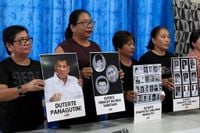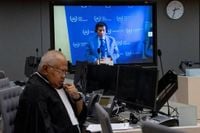In a landmark decision that has sent ripples through the Philippines and the international legal community, the International Criminal Court (ICC) Pre-Trial Chamber I has unanimously denied former President Rodrigo Duterte’s request for interim release from detention in The Hague. The ruling, made public on October 11, 2025, was welcomed by families of victims of the Duterte administration’s controversial war on drugs and by human rights organizations, who see it as a vital step toward justice after years of impunity.
The ICC’s decision follows intense legal wrangling by Duterte’s defense team, who argued that the 80-year-old former leader was unfit to stand trial due to cognitive impairment and that his continued detention was both unnecessary and unjust. According to Reuters, Duterte’s lawyers claimed he posed no flight risk and would not interfere with ongoing proceedings. They also cited his age and alleged health issues as grounds for his release, emphasizing that he was no longer in power and had no reason to evade justice.
However, the court was unconvinced. In its detailed 23-page ruling, the Pre-Trial Chamber cited Duterte’s history of intimidating witnesses and the enduring political influence of his family in the Philippines as key reasons for denying his release. The judges noted that Duterte’s continued detention was necessary to ensure he would appear in court and to protect the integrity and fairness of the proceedings. The ICC further pointed to comments made by Vice President Sara Duterte, who publicly questioned the court’s legitimacy and even discussed the possibility of breaking her father out of detention—remarks the judges said reinforced concerns about potential flight and interference.
For the families of those killed in the war on drugs, the ICC’s decision represents a rare moment of validation. As reported by ABS-CBN and other outlets, relatives of victims expressed relief and hope that accountability for the thousands of extrajudicial killings under Duterte’s administration might finally be within reach. “Finally, there’s recognition of the suffering endured by so many,” said one family member, echoing a sentiment shared by many who have long felt overlooked by both their own government and the international community.
Lawyer Kristina Conti of the National Union of Peoples’ Lawyers (NUPL), which represents several families of victims, emphasized the significance of the ruling. “We are relieved that this shows a fair amount of trust and respect for victims, often overlooked in international law,” Conti told reporters, as quoted by the Philippine Daily Inquirer. She added, “The decision on interim release is mollifying, but at the same time reminds us of how influential the Dutertes still are.”
The ICC’s ruling also addressed concerns raised by Duterte’s defense about his health and ability to participate in legal proceedings. According to the court, Duterte has access to medical care, with a nurse available 24/7, and is allowed family visits. The judges concluded that there were “no health or security barriers” to his participation in the trial, directly contradicting claims by Duterte’s lawyers and family that he was not receiving proper care or was at risk in detention. “This decision tells us that Duterte is still okay. They’re saying, yes, (the defense) presented medical results, but the ICC said the conclusions or the extrapolations of the defense cannot be taken as fact,” Conti explained.
The court’s ruling also made clear that the issue of Duterte’s fitness to stand trial is “factually and legally separate” from the question of his interim release. While the defense has filed a separate motion arguing that Duterte’s cognitive impairment renders him unfit for trial, the ICC has yet to rule on that matter. As Reuters noted, international courts rarely find even elderly suspects wholly unfit for trial, and the ICC has indicated a willingness to accommodate Duterte’s condition by allowing remote participation or breaks during hearings if necessary.
Beyond the legal technicalities, the ICC’s decision has reignited debate in the Philippines about accountability, political power, and the legacy of Duterte’s war on drugs. Davao City Representative Paolo “Pulong” Duterte, the former president’s son, dismissed the ruling as “political theater,” insisting that his father is “definitely not a flight risk” and has been the victim of political persecution since leaving office. In a strongly worded statement, the younger Duterte accused those responsible for his father’s arrest of “kidnapping” and vowed, “You will pay for this crime that you have committed.”
Despite such pushback, the decision has been widely celebrated by victims’ families and advocacy groups. The International Coalition for Human Rights in the Philippines (ICHRP) called the ruling “right and just,” stating that it “upholds the safety, rights and wishes of the victims who have faced the terror of Duterte’s Presidency.” ICHRP vice chair Patricia Lisson urged continued international support for survivors and their families, many of whom still face harassment and threats. “We must continue to stand behind them, provide any support possible, and demand justice for the thousands of victims of Duterte’s war on the poor and dissent,” Lisson said.
The ICC’s decision also sheds light on Duterte’s alleged efforts to obstruct justice. According to the court, there is a documented history of Duterte and his associates interfering with investigations, including threatening witnesses and instructing police officers to remain loyal and deny allegations of extrajudicial killings. The ruling referenced an alleged meeting in which then-Senator Alan Peter Cayetano, a Duterte ally, reportedly told police officers to “remain loyal” and deny accusations during Senate hearings on the Davao Death Squad. The court also cited testimony that former Philippine National Police chief Ronald “Bato” dela Rosa told confessed hitman Arturo Lascañas that if other gunmen spoke against Duterte, they should be “neutralized immediately.”
For those who lost loved ones in the drug war, the ICC’s attention to these details is both reassuring and sobering. Jane Lee, whose husband was killed in 2017, said that keeping Duterte in detention brings her “peace of mind,” but she hopes to see other perpetrators held accountable as well. “It doesn’t feel right that after all these years, they act like they have no remorse for their actions. And they even treat themselves as victims who are being persecuted,” Lee remarked.
As the legal process continues and the world watches, the ICC’s decision to keep Duterte in detention marks a pivotal moment in the ongoing struggle for justice in the Philippines. While challenges remain and the outcome is far from certain, for many families, this ruling is a long-awaited sign that their voices—and their pain—are finally being heard.


